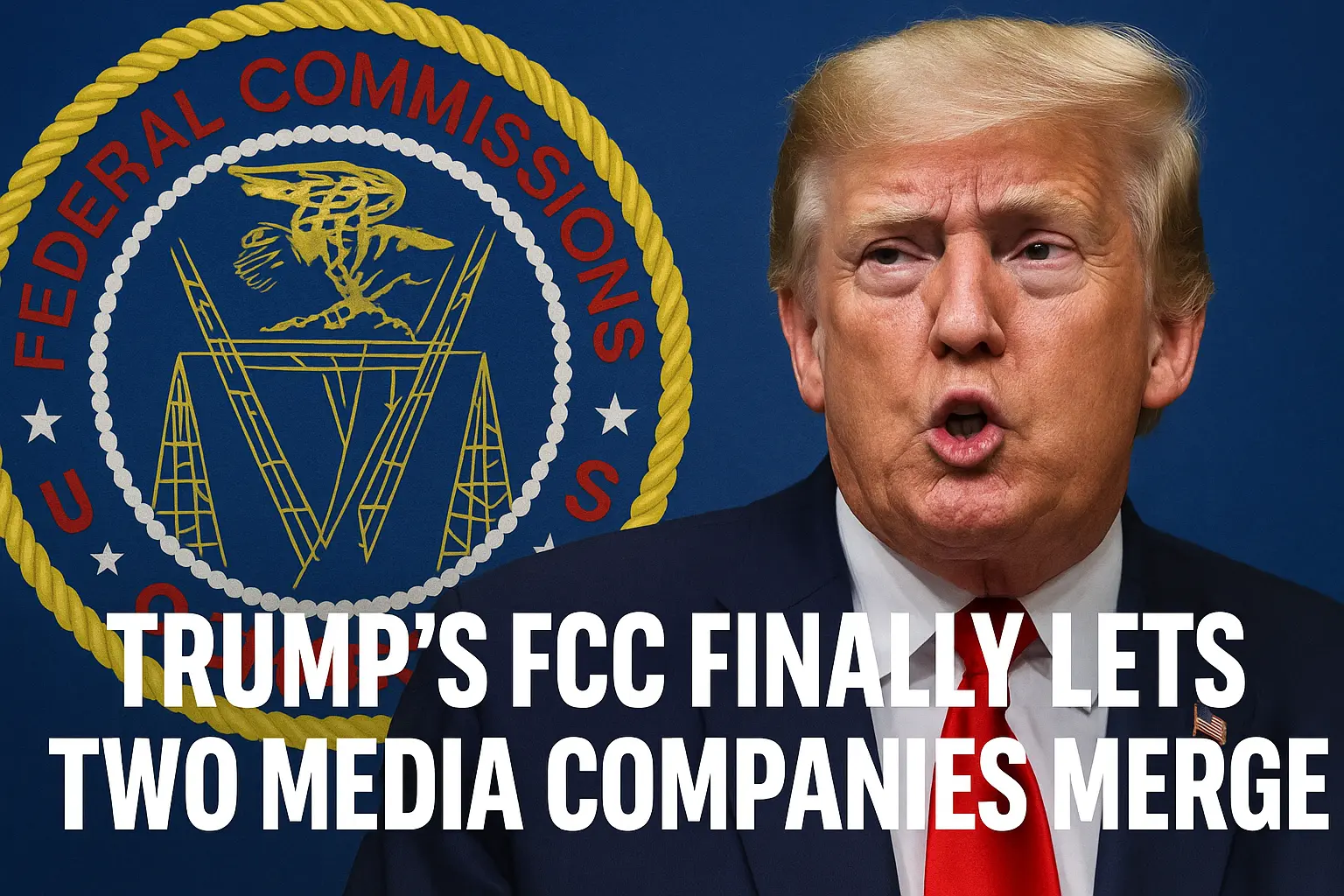Trump’s FCC approves $8B Paramount-Skydance merger, triggering political backlash, DEI policy reversals, and media ethics concerns.
Table of Contents
Trump’s FCC Finally Lets Two Media Companies Merge: Inside the Paramount-Skydance Deal and Its Ripple Effects
Introduction: A Merger That Redefines Media Power
In a move that’s ignited fierce debate across political, media, and public circles, the Federal Communications Commission (FCC), under the Trump administration, has formally approved the $8 billion merger between Paramount Global and Skydance Media. What began as a routine regulatory review has morphed into a flashpoint for discussions around press freedom, political interference, diversity and inclusion, and the evolving media landscape in America.
With the Trump FCC approving the merger in a 2-1 vote split along party lines, critics are calling foul over potential backroom deals, bias policing, and DEI policy rollbacks. Supporters, meanwhile, argue that the move could reestablish public trust in mainstream media and diversify political viewpoints.
Let’s unpack the key events, implications, and controversies shaping what is already being called the most politically charged media merger in years.
The Chronology: How the Paramount-Skydance Merger Took Shape
Early 2024: Deal Discussions Begin
Rumors of a merger between Paramount Global and Skydance Media began circulating in early 2024. David Ellison, CEO of Skydance and son of Oracle billionaire Larry Ellison, led the charge to acquire Paramount’s vast content empire, including CBS, MTV, Comedy Central, and streaming service Paramount+.
Mid-2024: FCC Involvement and Trump’s Criticism
As the deal moved to the regulatory phase, FCC Chairman Brendan Carr—a Trump appointee known for echoing the former president’s media skepticism—began voicing concerns. Around this time, Trump took to Truth Social to denounce CBS News, a Paramount subsidiary, as being riddled with “fake news and liberal bias.”
July 2024: DEI and Ombudsman Commitments
To gain FCC approval, Skydance agreed to:
- Install an ombudsman at CBS News to monitor for political bias
- Halt any new Diversity, Equity, and Inclusion (DEI) policy implementations
- Commit to broadcasting viewpoints from across the political spectrum
These concessions were praised by Carr and other conservative voices but drew backlash from Democratic lawmakers and media watchdogs.
July 25, 2024: FCC Approval Finalized
The FCC gave the green light in a 2-1 vote. Carr, along with another Republican commissioner, approved the deal. Democratic Commissioner Anna Gomez dissented, citing concerns of undue political influence.
The Fallout: Reactions from All Angles
Media Ethics Under Fire
The Paramount-Skydance merger, especially given its DEI policy rollback, raises questions about political influence on editorial independence. CBS journalists expressed concern over how these changes might impact their reporting, especially as they continue to cover Trump’s 2024 campaign.
Democratic Outrage
Senators Ed Markey, Ben Ray Luján, and Elizabeth Warren decried the FCC decision, labeling it corrupt and undemocratic. Trump’s claim that Paramount agreed to over $36 million in value—including a $16 million contribution to his future presidential library—fueled these accusations.
Gomez’s dissent was equally pointed: “The Paramount payout and this reckless approval have emboldened those who believe the government can — and should — abuse its power.”
Public Trust: Rebuilt or Broken?
Carr argued the merger would help rebuild trust in journalism by eliminating bias. However, critics say it could lead to self-censorship and reduced journalistic independence. CBS’s flagship programs like 60 Minutes and The Late Show with Stephen Colbert are already feeling pressure.
Jon Stewart, in his monologue on The Daily Show, sarcastically questioned whether Colbert’s show was canceled for financial reasons—or political compliance.
The Bigger Picture: What This Means for the Media Industry
1. DEI Rollback: A New Precedent?
Paramount’s agreement to halt new DEI initiatives may embolden other media companies to follow suit—particularly those seeking regulatory favor. This could shift the industry away from years of inclusive policy development.
2. The Power of Political Pressure
With Trump’s open disdain for CBS and his visible influence on Carr, this merger sets a precedent for future administrations to manipulate regulatory bodies to favor their media preferences.
3. Monopoly Concerns
Critics warn that fewer media conglomerates mean less diversity in storytelling and fewer independent voices. The merger significantly expands Skydance’s reach and could limit competition in entertainment and news media.
Expert Insights: What Media Analysts Are Saying
- Jeffrey Sonnenfeld, Yale SOM: “This merger isn’t just business—it’s politics. When regulatory approval comes with political strings, democracy suffers.”
- Jessica González, Free Press: “We are witnessing the weaponization of the FCC. This sets a terrifying precedent for future deals.”
- Sean McLaughlin, former FCC advisor: “Mergers should be judged on public interest—not political loyalty. This one clearly blurs the lines.”
FAQs
What is the Paramount-Skydance merger?
It’s an $8 billion acquisition where Skydance Media is taking control of Paramount Global, including CBS, MTV, and Paramount+.
Why is Trump’s FCC involved?
The FCC regulates communications and media mergers. Under Trump-appointed Brendan Carr, the agency approved the deal with stipulations that align with Trump’s criticisms of mainstream media.
What is the CBS DEI controversy?
As a condition of the merger, Skydance agreed to halt any new DEI policies at CBS and install an ombudsman to monitor bias, sparking criticism from Democrats.
Was money exchanged for Trump’s approval?
Trump claimed Paramount and Skydance pledged $36 million toward his presidential library and PSA campaigns. Democrats say this resembles a “bribe,” but the companies deny any link to the merger.
How will this affect CBS News?
CBS must now operate under new editorial oversight and without new DEI policies, raising concerns among staff about autonomy and censorship.
Is this merger good for consumers?
That remains to be seen. While some believe it could lead to more politically diverse programming, others fear increased consolidation and less editorial freedom.
